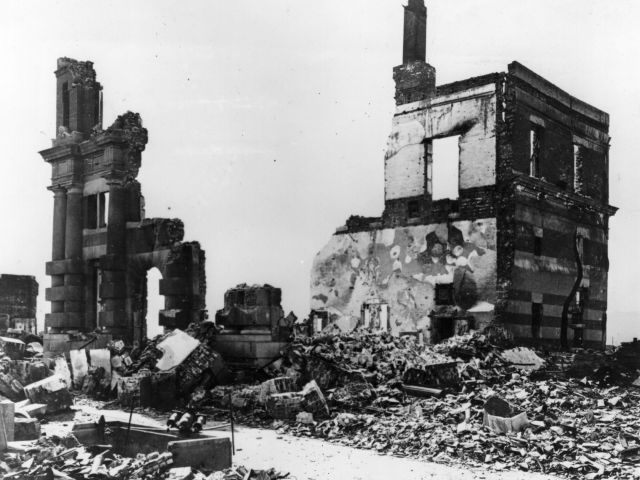Seventy years ago, the B-29 Enola Gay, piloted by Paul Tibbets, Jr., dropped an atomic bomb, Little Boy, on the Japanese city of Hiroshima. The blast and ensuing radiation killed an estimated 150,000 people. Though the devastation from the bombing was astounding, it did not bring American’s war with Japan or World War II to an immediate end. Three days later, the United States dropped another atomic bomb, Fat Man, on Nagasaki, and the Empire of Japan’s leaders finally capitulated.
Many mainstream media organizations, such as the New York Times, clearly focus their remembrance of the occasion on those who died in the blast, or peddle a generally anti-nuke line. In this narrative, the Japanese were an aggrieved people who suffered at the hands of a cruel and remorseless United States.
Although there are constant attempts to condemn the bombings as unnecessary, Americans at the time were widely supportive of their use, and tens, if not hundreds of thousands of lives were saved by avoiding an invasion of the Japanese homeland.
Historian Ronald H. Spector wrote in Eagle Against the Sun: The American War with Japan about the plan to invade the island nation and its potentially cataclysmic levels of casualties. In preparation for the invasion of Japan, codenamed “Downfall,” American military planners attempted to estimate the cost of the assault and the long battle to take the islands of Japan based on the recent bloodbaths in Okinawa and Iwo Jima. Specter noted that in a briefing with President Harry Truman, the Joint Chiefs of Staff presented a plan to invade the Japanese home island of Kyushu. Based on the casualty rate from Okinawa—which was around 35 percent—and the nearly million men that would be required for such an assault, the United States could reasonable expect “268,000 dead and wounded.” These would just be the initial casualties.
Though the most recent battle over Okinawa lead to the death of almost every Japanese soldier fighting on the island, it “had the paradoxical effect of discouraging the Americans while inspiring the Japanese.” The Japanese homeland was much easier to defend, and its defenders would be just as, if not more, fanatical.
Spector concluded, “To the infantryman and marines preparing for the assault on Japan, to the sailors who had undergone the weeks of Kamikaze attacks off Okinawa, the atomic bombs seemed not the first chapter of a catastrophe for mankind, the dawn of a new age of terror, the first gun of the cold war but, in Churchill’s words, a ‘miracle of deliverance.’”
Alonzo Hamby wrote a piece in the Wall Street Journal that condemned the critics of the atomic bombing who say that the Japanese were “ready to surrender.” He wrote, “Clearly this was not the case. Japan could still muster formidable military resources. It is unlikely that resistance would have ever gotten down to teenagers armed with clubs and sticks but probable that an amphibious invasion of Kyushu would have exacted a price reminiscent of Okinawa. That possibility was unthinkable to most Americans.”
The remarkably perceptive French observer of American life in the early 19th century, Alexis de Tocqueville, fully understood the deadly power of the American people if and when they chose to take up arms. He described how Americans, the most “democratic” people in human history, would be slow to act as war approached, but once roused, would unleash more destructive force than its foes, more than any authoritarian society.
The Frenchman wrote in Democracy in America:
When a war has at length, by its long continuance, roused the whole community from their peaceful occupations, and ruined their minor undertakings, the same passions which made them attach such importance to the maintenance of peace will be turned to arms. War, after it has destroyed all modes of speculation, becomes itself the great and sole speculation, to which all ambitious desires that equality engenders are exclusively directed. Hence it is that the selfsame democratic nations which are so reluctant to engage in hostilities, sometimes perform prodigious achievements when they have taken the field.
Historian Erick L. McKitrick wrote, “Democratic war would tend, by this logic, toward total involvement. The moral as well as the physical resources of the nation would eventually be organized in support of the war effort, and the conflict itself would readily take on the quality of a great crusade, fought by all society for the preservation of its principles.”
The “prodigious” achievement of World War II was unleashing the “arsenal of democracy” on the Axis powers, and the enormous Manhattan Project that created the atomic bombs. No country in the world had the power or resources to carry out such undertakings except the United States.
As with the Civil War and the attack on Fort Sumter, World War I and the attack on American shipping, World War II and the attack on Pearl Harbor, and most recently the 9/11 attacks that led to the Iraq and Afghanistan Wars and a larger war against radical Islam, the United States is the world’s most deadly nation once provoked.
Dropping atomic bombs brought a just end to World War II, a more deadly and terrible conflict than any in world history. The United States neither wanted nor started the war, but after it was dragged into the fight by the Japanese attack on Pearl Harbor, there was no turning back on the total war that followed.

COMMENTS
Please let us know if you're having issues with commenting.